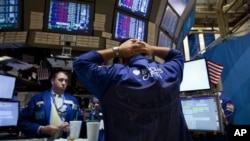U.S. stock market prices plunged in Thursday's trading, wiping out all the gains made so far this year. Investors were apparently worried about the debt crisis in Europe and reports suggesting that U.S. economic growth may not resume as quickly or as strongly as had been hoped.
In New York trading, the Dow Jones Industrial Average fell 513 points, or 4.3 percent. The S&P 500, which tracks large companies, was down 4.8 percent. And the many technology stocks in the NASDAQ were hurt even more, falling 5.1 percent.
Earlier, European indexes also posted sharp losses.
Altogether, it is the biggest retreat since the financial crisis of 2008 and 2009, and it worries Barton Biggs, who manages the financial firm,Traxis Partners of Greenwich, Connecticut.
"We are into a panic sell-off and it is very scary," said Biggs. "It is very scary because of the secondary consequences it's going to have on consumer confidence and business confidence."
Consumer confidence is important because people who are worried about their economic future are less likely to do the spending that drives most U.S. economic activity. Low business confidence reduces the chances that firms will make the investments needed to start or expand businesses and create jobs.
While many investors are worried, James Paulsen, the chief investment strategist of Wells Capital Management thinks falling stock prices are an opportunity for investors to buy stocks cheaply and make money - if they are bold enough.
"I'm kind of optimistic we have been in a soft patch now for several months, so we have already sort of been consolidating, and refreshing values," said Paulson. "You now have the opportunity to buy the S&P 500 at a little over 13 times, trailing 12-month earnings."
Under a measure frequently used by investors, that is a relatively cheap price for stocks.
Paulson and Biggs spoke to the Bloomberg financial news service.
Some other analysts say investors may be getting out of stocks before a key economic report on the U.S. job market is released Friday.
Economists surveyed by news agencies predict that the jobless rate will remain at 9.2 percent, and the economy will have a net gain of 85,000 jobs.
The unemployment rate is relatively high by U.S. standards, and it will take significantly larger job gains to reduce that number.
Unemployment is a key economic and political issue in the United States.
Stocks Plunge in US, Europe




